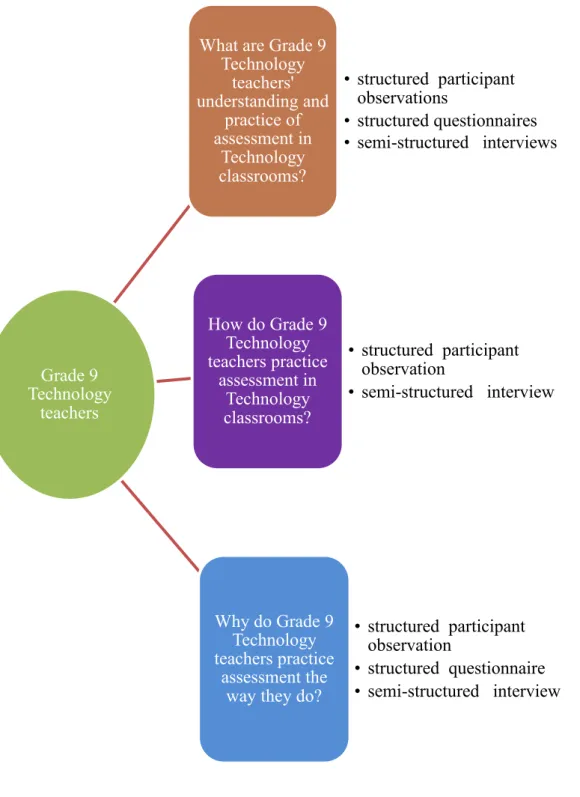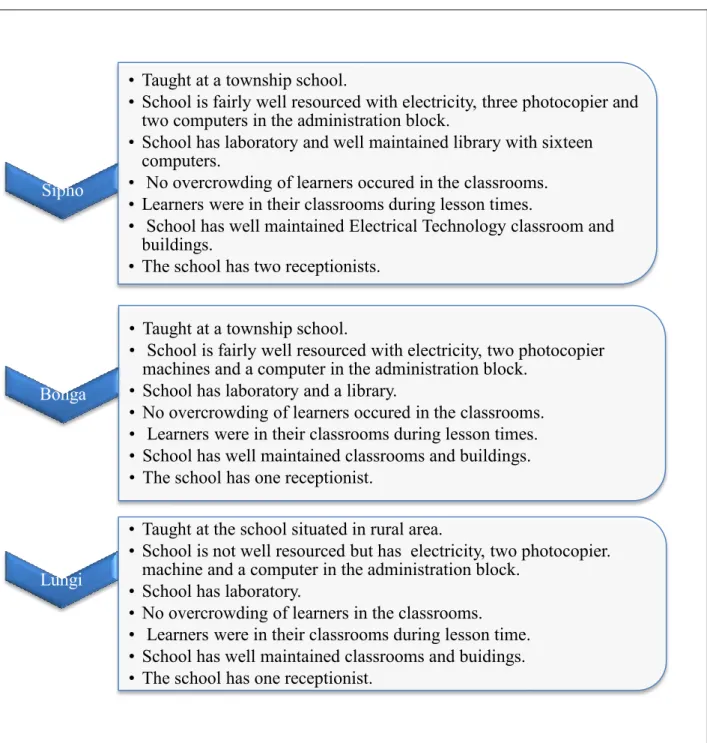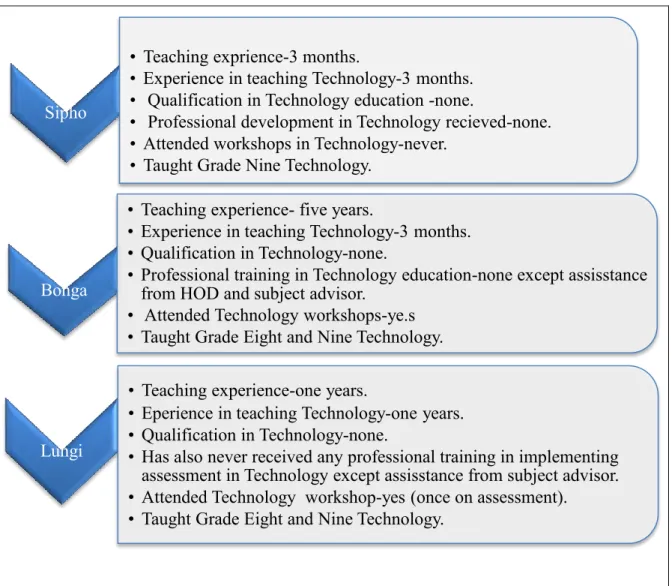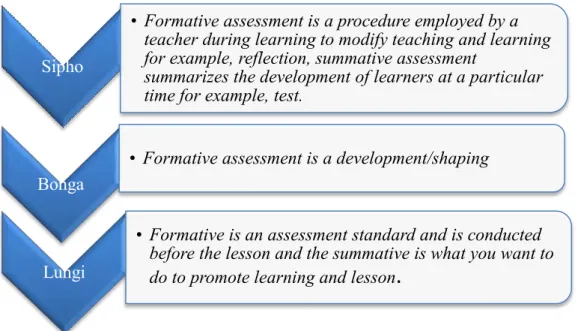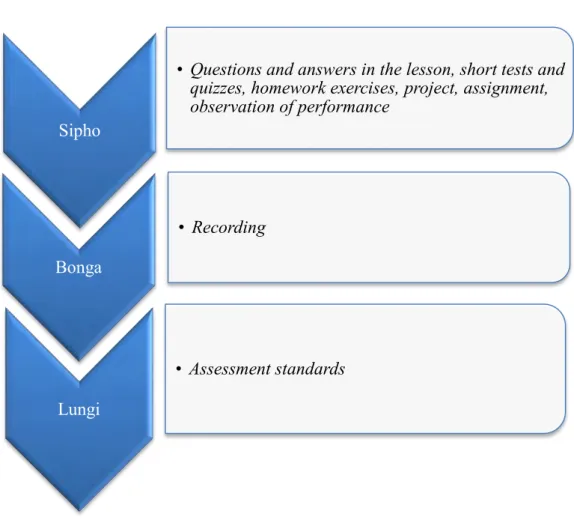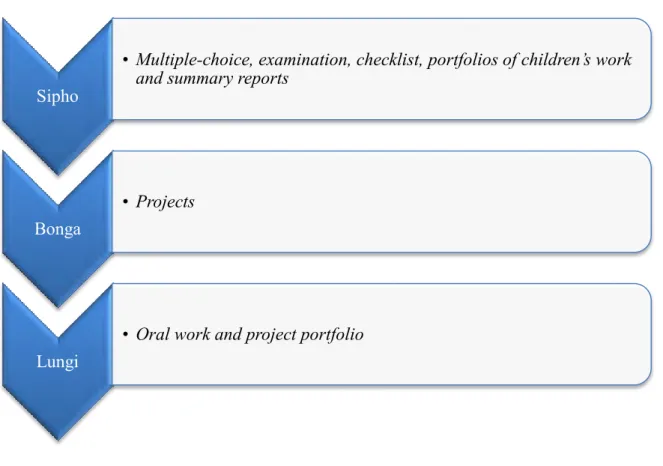Three methods of data collection were used, namely semi-structured interviews, structured participant's observations and structured questionnaires to collect data from the participants. The theoretical framework used to analyze this study is assessment theory. The model proved to be a useful tool and framework to support good decision-making when designing and making products for projects in Technology. The findings of the study indicate that assessment in Technology is still a challenge for teachers.
Broad problems and issues to be studied
The questions asked in the questionnaire related to teachers' biography, professional development, understanding of assessment and implementation of the assessment. Eh ..the term diversity means something that is not grounded in a single specification, in other words something that includes more than one element. I like that it encourages expansion..the expansion of our human ability to use scientific knowledge for practical purposes.
The purpose of this study was to explore teachers' understanding and practice of assessment in the field of technology. The purpose of this study was to explore nine technology teachers' understanding and practice of assessment in technology. The study findings were based on the three Year 9 technology teachers' understanding and practice of assessment, and the way they practice assessment in their classrooms.
2008).Selection of teachers' understanding of assessment four years after the implementation of the New Assessment Policy.
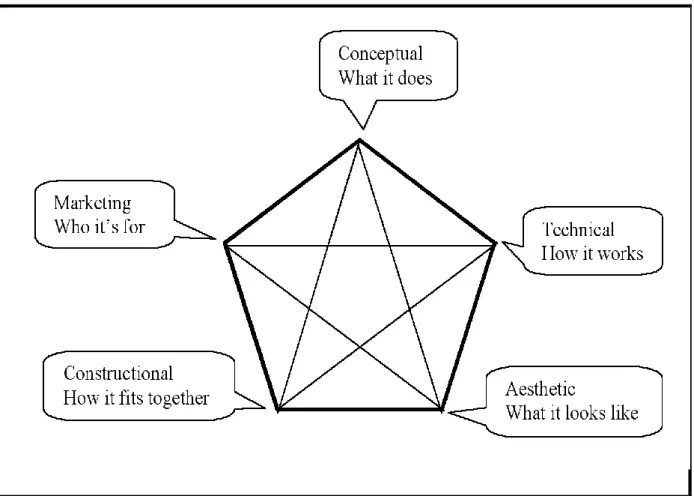
Focus, purpose and research of thestudy
The rationale for the study
The study draws on information from Black and William (1998) as these authors provide a comprehensive framework for thinking about teacher assessment practices, beliefs, and understandings of assessment. This becomes clear when they argue that assessment is a useful framework for thinking about the knowledge teachers would need to integrate assessment into teaching and how teachers' understanding of assessment might be developed (Black & William, 1998). .
Methodology
Because teachers view assessment as challenging and changing, teachers' understanding of assessment needs to be explored and understood to expand teacher development by those involved in teacher development (Stiggins, 2005). Structured participant questionnaires were used to gather background information on each teacher's understanding of assessment and the reasons why these teachers practice assessment in the way they did.
Significance of the proposed study
Participants were interviewed by the researcher to explore how they practice assessment in technology classrooms. The researcher used a structured participant observation schedule to collect information while observing the three teachers teaching the design process and also while evaluating the design process.
Definitions
It provides information that is used to support the learner's development and to make improvements in the learning process. The use of alternative assessment is related to the change in the form of assessment used to accommodate all learners.
Outline of the study
The data analysis strategies were pragmatic in that inductive analysis was used for teachers' understanding and deductive for teachers' practices of assessment in Technology. The data is presented as a cross-case analysis of the teachers' understanding according to the following categories: teachers'.
Introduction
Conceptual framework-meaning of assessment and use
The three main purposes of assessment are primarily assessment for learning, which occurs when teachers use inferences about student progress to inform their teaching (formative). The purpose of assessment for learning is to continuously collect information about student performance, which teachers can use to improve student learning (DBE, 2011).
Researching assessment
- Teachers and Assessment
- Researching Assessment and Technology (subject)
- Assessment practices in an emerging curriculum
- Role of assessment in enhancing Technology literacies
Teachers need to transform their assessment methods and apply criteria when assessing students' work so that assessment can be effective (Rifaat, Ali, Sabhan, Al, Waleed, & Nour, 2012). Therefore, teachers must ensure that assessment benefits students' knowledge, skills and development (Redfield, Roeber & Stiggins, 2008).
Implementation of assessment in Technology
Pudi (2005) claims that different methods, forms and types of assessment can be used to facilitate the achievement of results. They devise their own strategy as they are only interested in one and do the other to satisfy the teacher (Barlex, 2007).
Theoretical frameworks
Assessment theory
Additionally, according to the National Curriculum Statement, Grade R-12 (DBE, 2011), assessment must allow for ongoing assessment of student progress toward achieving stated outcomes (Killen, 2000). In addition, teachers should use students' prior knowledge as a basis for further learning while identifying gaps that may exist.
Barlex’s model
This could be a brief that covers iterative aspects of the design process that include Investigate, Design, Make, Evaluate and Communicate (IDMEC). Teachers should encourage learners to take ownership of their design so that they will learn to overcome the challenges they encounter during the design process (Barlex, 2007).
Conclusion
The research questions, the selection of participants and the choice of data collection methods, including the design of the instruments, are based on the chosen paradigm, which in this study is the interpretive paradigm and data collection methods. In this study, various data collection methods were used to collect data, namely questionnaires, interviews and observations.
Research design
Teachers' understanding and practice of assessment depends on the quality and consistency of teachers' assessment and the quality of the type of task used (Morgan & Watson, 2002). In this study, I paid close attention to the school context of the participants and teacher factors, their biography and the way in which they assessed the learners.
Selection of participants
Data collection methods and instruments
Questionnaires
The reason for piloting the questionnaire was an experiment to see if the questions were appropriate or if the questionnaire requires adjustment (Cohen et al., 2007). The questionnaire was given to the participants to complete on the first day of the researcher's visit to meet the teachers. It took the teachers nearly two hours to complete the questionnaire, which was longer than expected.
Interviews
Observation confirmed that none of the participants promoted creativity as participants mentioned in the interview. He compared learners' designs in the project portfolio with the project that was awarded points during the presentation of the project. Nevertheless, the participants encouraged learners to make the most of the skills during the design process.
Observation
Data analysis
The following convergent radial diagram shows how data analysis was conducted to examine teachers' understanding and assessment practice. Appraisal theory was used to analyze the data, where the researcher examines the participants' responses in relation to Barlex's (2007) model. Participant responses were compared using sorting and screening where the researcher looked for types, similar patterns or ideas so that the researcher could inductively analyze the data for emerging themes (Cresswell, 2009).
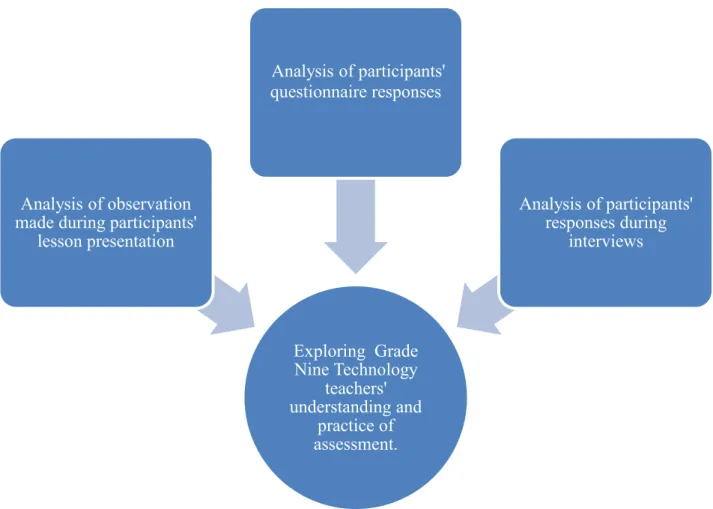
Data collection process
On the first day, I distributed questionnaires to the participants and collected the completed questionnaires. The second phase shows three days, the first day I observed and interviewed the participants when they were learning about design and how they facilitated when the students were designing in their groups. On the third day I observed two participants facilitating as each group evaluated the other group's presentation.
Design limitations
The production phase includes the production of the model according to the working sketch, measurement and selection of materials and tools.
Trustworthiness
Multiple methods used to compensate for individual limitations led to a more valid, reliable, and diverse construction of reality. In order to increase the accuracy of the research, another teacher who was not involved in this study was selected to pilot the research instruments. The reason for piloting was to see if the teacher would be able to understand and answer the questions in the data collection schedules before generating data from the participants for this study.
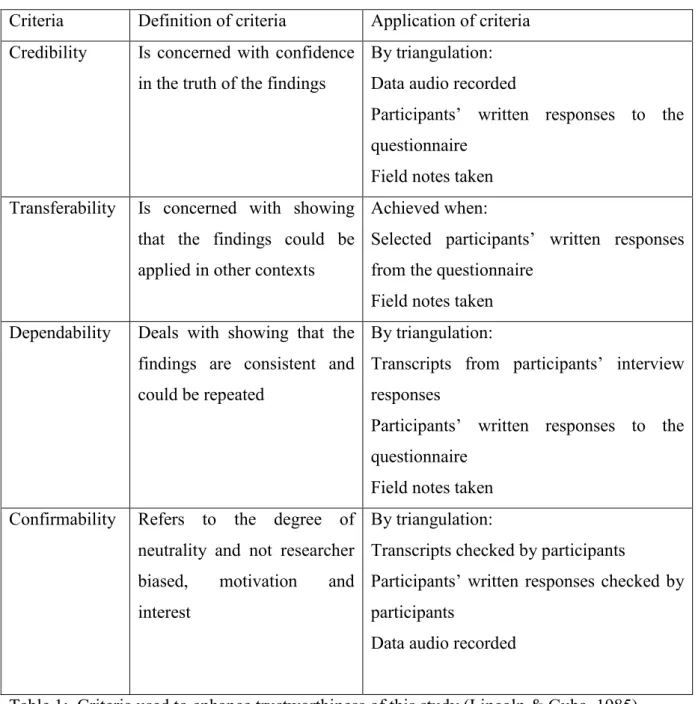
Ethical issues
Conclusion
Qualitative data analysis focused on the organization, analysis and interpretation of data (Cohen, Manion & Morrison, 2011). Qualitative data analysis occurred when the researcher looked for types, classes, sequences, processes, or patterns (Cohen et al., 2011). The goal of data analysis is to construct or reconstruct data in a meaningful or understandable way (Evans, 2009).
Presentation of findings
Context of the school
Unlike Sipho's school which also has 16 computers in the library, both Bonga's and Lungi's schools do not have computers in the library and there is no library in Lungi's school, but their schools both have a laboratory. All three schools had well-maintained school buildings; However, Sipho's school was better in terms of physical resources compared to Lungi's and Bonga's schools. Although Lungi's school is located in the rural area and was recently built, it is still in good condition.
Biography of participants
The subject advisor visited Lungi's school to offer his help with technology and spend the whole day helping him.
Cross case-analysis of findings
Understanding and knowledge of assessment practices
- Teacher’s understanding and practice of assessment in Technology
- Teachers’ understanding of formative and summative assessment in
- Teachers’ understanding of kinds of assessment in formative assessment
- Teachers’ understanding of performance assessment in Technology
- Teachers’ understanding of similarities between formative assessment and
- Kinds of tasks teachers use to assess learners in Technology
Implementation of assessment practices
- Teachers’ implementation of assessment in Technology
- Nature of assistance offered to teachers
- Teachers reinforcing subject matter during the lesson
- Reflection on poor performance
- Teachers’ assessment practices in Technology
- Usage of appropriate assessment practices
- Types of assessment that teachers use when assessing technology design
Purpose of assessment practices
- How teachers encourage creativity in Technology classroom
- Assessment procedures that teachers use when assessing learners design process
- Teachers’ experiences when assessing learners’ design
- Teachers’ measurement of learners’ performance
- Teachers’ subjective judgment
- Capturing learner’s interest and attention during lesson
- Teachers’ views on projects done outside school premises
- Teachers’ understanding of the term diversity
Teachers’ assistance to learners struggling with Technology design
- Teachers’ perception of Technology curriculum
- Teachers’ interest in the subject Technology
He did not mention what is developed in formative assessment, but it is not clear whether he was referring to student understanding. Sipha and Bonga's response to the interview revealed that there should be criteria for evaluating students' plans. Sipha and Bonga's answers during the interview indicated that the students' plans were poor, but they encouraged the students to improve them.
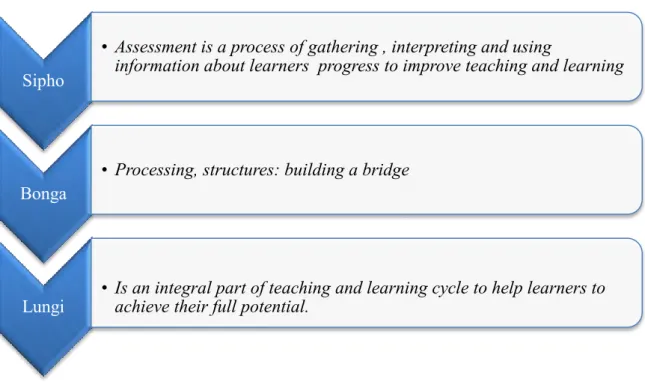
Linking understanding and practice of participants
Performance assessment
The table also includes the ratings that the participants commented on and the ratings that I observed during classroom observation. I observed that all three teachers used formative assessment to assess informal daily activities and provide feedback to students. However, the grades obtained in these activities did not need to be recorded because the teachers used these activities for informal assignments.
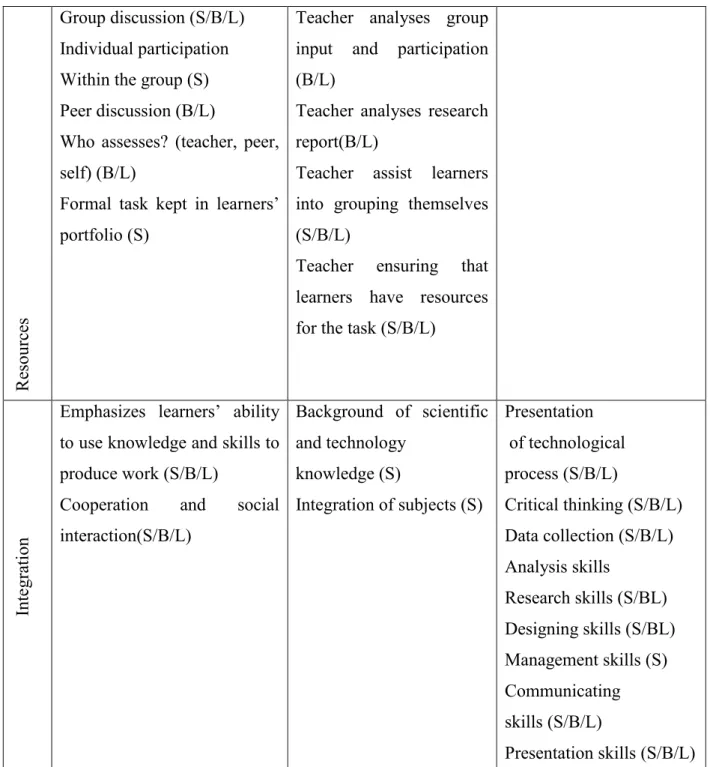
Designing and making process
None of the participants asked the students about the mind map, which is used to organize ideas when the students plan to design and build their product. I noticed that the girls lacked motivation and were not actively involved in the design of the two-story house. During the planning lesson, I noticed that some students were having trouble measuring while planning a two-story house.
Conclusion
However, the analysis revealed that teachers struggle with the understanding of assessment in Technology. The purpose of this study was to explore Grade Nine Technology teachers' understanding and practice of assessment in Technology in the Estcourt district. Perception about assessment in Technology education 1.1 What kind of tasks do you assess in Technology.
Discussion of findings
What are Grade Nine Technology teachers’ understanding of assessment in Technology
Sipho's understanding of assessment seemed to be in line with the definition of assessment in technology policy (DBE, 2011). The proceedings from the International Conference on Technology Education in the Asia Pacific Region 5.-7. January 2006. Perceptions of assessment in technology education Researcher: What kind of tasks do you assess in technology.
How do Grade Nin Technology teachers practice assessment in Technology
- Designing process
- Making process
Why do Grade 9 Technology teachers practice assessment the way they do
Recommendations
As Earl (2003) points out, teachers' skills and knowledge and understanding of assessment practices are the main focus and should be developed as assessment is the only tool teachers use to see if students have understood the content of the subject they have been taught. . Future research in Technology should focus on how teachers' assessment skills and knowledge and their understanding of assessment - specifically, performance-based assessment is implemented in Technology classrooms as teachers are expected to equip students with innovative skills and creative. Compton and Harwood (2003) confirmed that the lack of knowledge in technology education was due to insufficient knowledge of teachers.
Implications
An analysis of the technology education curriculum of six countries. 2005).Theories of Learning: A Conceptual Framework for Learning and Teaching in Technology Education.
